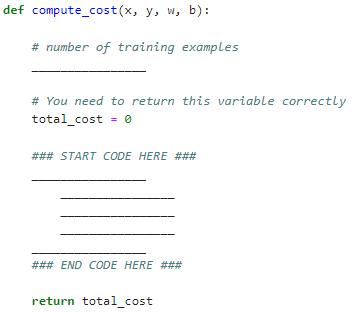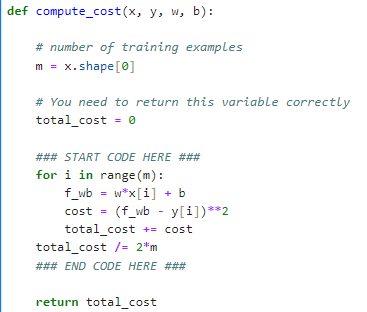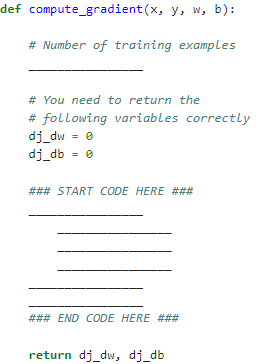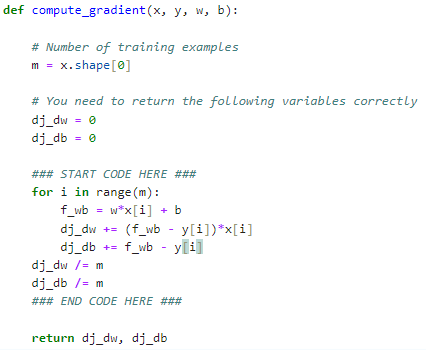Linear Regression From Scratch
1/12
Earn XP
Description and Tags
How to create a Linear Regression ML model with only python and numpy.
Name | Mastery | Learn | Test | Matching | Spaced |
|---|
No study sessions yet.
13 Terms
Linear Regression Model with 1 Variable
The goal is to find the best w and b parameters that fit the data

Cost Function for 1 variable Linear Regression Model
Find w and b that give you the smallest cost value. This gives you the parameters that best fit the data.

Model Prediction for 1 variable
Equation for a line, with an intercept b and a slope w.

Exercise 1 objective: complete compute_cost
Iterate over the training examples for each example and compute,
the prediction of the model for that example
the cost for that example
return the total cost over all examples
what is m?
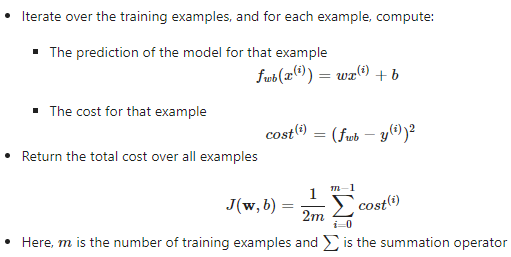
def compute_cost(x, y, w, b):
# number of training examples
__________________________
# you need to return this variable correctly
___________________________
# start loop here
____________________________
return total_costdef compute_cost(x, y, w, b):
# number of training examples
m = x.shape[0]
# You need to return this variable correctly
total_cost = 0
# start loop here
for i in range(m):
f_wb = w*x[i] + b
cost = (f_wb - y[i])**2
total_cost += cost
total_cost /= 2*m
return total_costGradient Descent Algorithm for parameters w and b for linear regression
parameters w and b are both updated simultaneously.
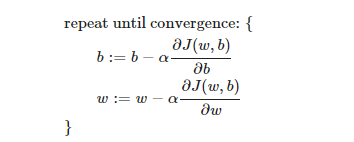
Derivative of
J(w,b)/db and J(w,b)/dw

Exercise 2 objective: complete compute_gradient
iterate over the training examples and for each example compute:
prediction of the model for that example
gradient for parameters w and b for that example
return total gradient update for all examples
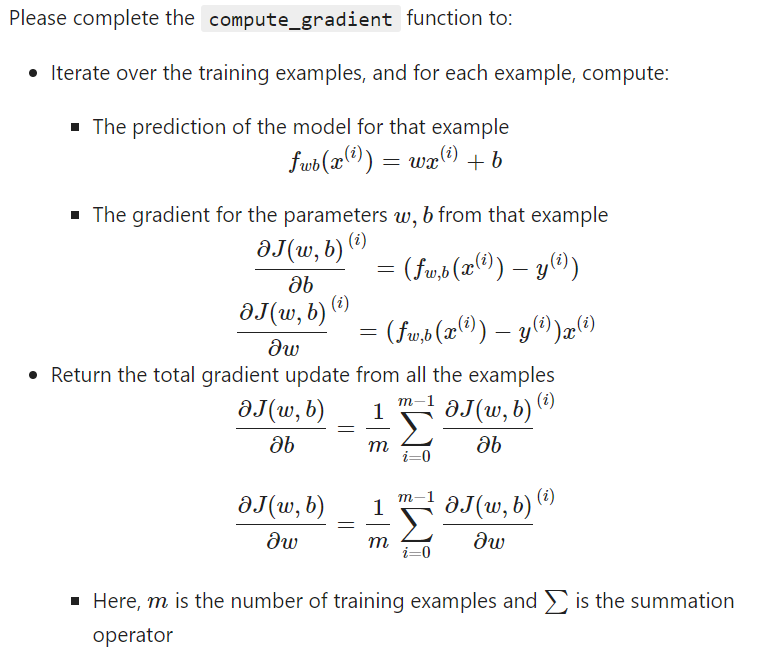
def compute_gradient(x, y, w, b):
# number of training examples
_________________________
# return the following variables correctly
_________________________
# start loop here
_________________________
#_____
#_____
return dj_dw, dj_dbdef compute_gradient(x, y, w, b):
# Number of training examples
m = x.shape[0]
# return the following variables correctly
dj_dw = 0
dj_db = 0
# start loop here
for i in range(m):
f_wb = w*x[i] + b
dj_dw += (f_wb - y[i])*x[i]
dj_db += f_wb - y[i]
dj_dw /= m
dj_db /= m
return dj_dw, dj_dbCode
def compute_cost(x, y, w, b):
# number of training examples
____________________
# You need to return this variable correctly
total_cost = 0
### START CODE HERE ###
for i in range(m):
______________________
______________________
______________________
______________________
### END CODE HERE ###
return total_cost
def compute_cost(x, y, w, b):
# number of training examples
m = x.shape[0]
# You need to return this variable correctly
total_cost = 0
### START CODE HERE ###
for i in range(m):
f_wb = w*x[i] + b
cost = (f_wb - y[i])**2
total_cost += cost
total_cost /= 2*m
### END CODE HERE ###
return total_cost
Code
def compute_gradient(x, y, w, b):
# Number of training examples
m = x.shape[0]
# You need to return the following variables correctly
dj_dw = 0
dj_db = 0
### START CODE HERE ###
for i in range(m):
f_wb = w*x[i] + b
dj_dw += (f_wb - y[i])*x[i]
dj_db += f_wb - y[i]
dj_dw /= m
dj_db /= m
### END CODE HERE ###
return dj_dw, dj_db
